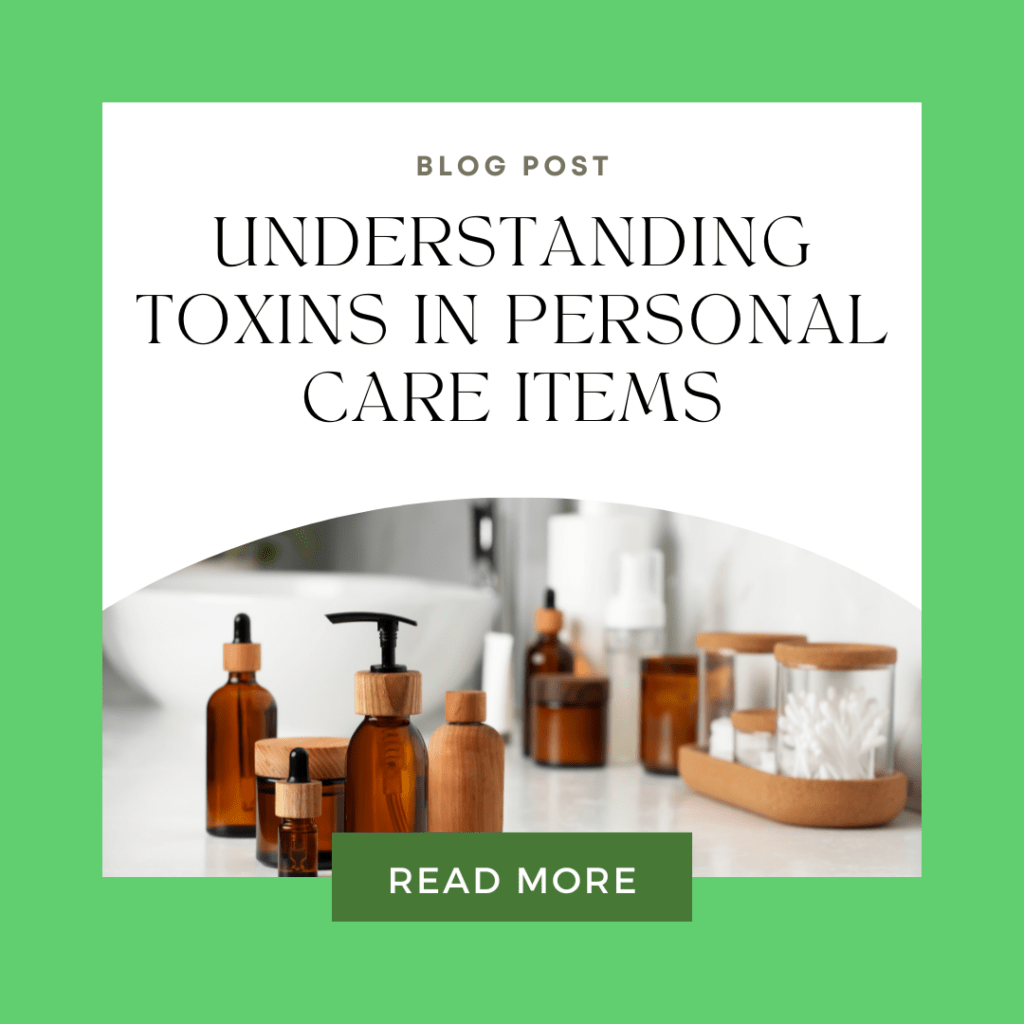In our quest for beauty and cleanliness, we often turn to personal care products to help us look and feel our best. However, what many people don’t realize is that these seemingly harmless products can contain a cocktail of toxic chemicals that pose serious health risks. From skincare to haircare to hygiene products, understanding the toxins in personal care products is crucial for safeguarding your health. In this article, we’ll explore:
- the hidden dangers in your personal care products,
- the health risks associated with exposure to these toxins,
- and provide tips for choosing safer, toxin-free alternatives.
Common Toxins in Personal Care Products:
Parabens:
Parabens are synthetic preservatives commonly found in:
- skincare,
- haircare,
- and cosmetic products.
They mimic estrogen in the body. Additionally, they are linked to hormonal disruptions, reproductive issues, and an increased risk of breast cancer.
Phthalates:
Phthalates are a group of chemicals used to soften plastics and improve the texture of personal care products like:
- lotions,
- shampoos,
- and fragrances.
They have been linked to reproductive problems, birth defects, and disruptions in hormone function.
Formaldehyde:
Formaldehyde is a known carcinogen and respiratory irritant commonly found in:
- hair straightening treatments,
- nail polishes,
- and preservatives.
Prolonged exposure to formaldehyde can increase the risk of cancer and respiratory disorders.
Sodium Lauryl Sulfate (SLS) and Sodium Laureth Sulfate (SLES):
SLS and SLES are foaming agents commonly found in:
- shampoos,
- body washes,
- and toothpaste.
They can strip the skin and hair of their natural oils, leading to irritation, dryness, and allergic reactions.
Synthetic Fragrances:
Synthetic fragrances are often made up of hundreds of chemicals, including phthalates. This is not disclosed on product labels due to trade secret laws. These hidden toxins can trigger allergies, asthma, and disrupt the endocrine system.
Health Risks Associated with Exposure to Toxins in Personal Care Products:
Hormonal Disruption:
Many of the chemicals found in personal care products, such as parabens and phthalates, can disrupt the endocrine system and interfere with hormone function. This can lead to:
- reproductive problems,
- thyroid disorders,
- and hormonal imbalances.
Allergic Reactions:
Synthetic fragrances and preservatives can trigger allergic reactions in sensitive individuals, including:
- skin rashes,
- itching,
- redness,
- and swelling.
These reactions can range from mild to severe and may require medical attention.
Respiratory Issues:
Inhalation of airborne toxins from personal care products, such as formaldehyde and fragrance chemicals, can irritate the respiratory tract. This can exacerbate conditions like asthma and allergies.
Cancer Risk:
Several chemicals found in personal care products, including formaldehyde and certain preservatives, have been classified as carcinogens. That means they can increase the risk of cancer, particularly breast cancer and leukemia.
Tips for Choosing Safer, Toxin-Free Alternatives:
Read Labels:
Take the time to read product labels carefully. That way you can avoid products containing ingredients like parabens, phthalates, formaldehyde, SLS, SLES, and synthetic fragrances. Look for natural, organic, and non-toxic alternatives instead.
Choose Natural Ingredients:
Opt for personal care products made with natural, plant-based ingredients that are free from synthetic chemicals and toxins. Look for certifications such as USDA Organic, EWG Verified, or Leaping Bunny, which indicate a commitment to safety and transparency.
DIY Your Products:
Consider making your own personal care products. You can use simple, natural ingredients like coconut oil, shea butter, essential oils, and botanical extracts. There are countless recipes available online for everything from homemade lotions and body scrubs to toothpaste and deodorant.
Research Brands:
Do your research and choose personal care brands that prioritize safety, transparency, and sustainability. Look for companies that conduct thorough ingredient testing, source ethically and sustainably, and use eco-friendly packaging.
By understanding the hidden dangers in your everyday personal care products and making informed choices about what you use on your body, you can reduce your exposure to harmful toxins and protect your health. Choose safer, toxin-free alternatives made with natural, plant-based ingredients, and prioritize brands that are committed to transparency and sustainability. Your body will thank you for it, and you’ll be taking an important step toward a healthier, toxin-free lifestyle.



